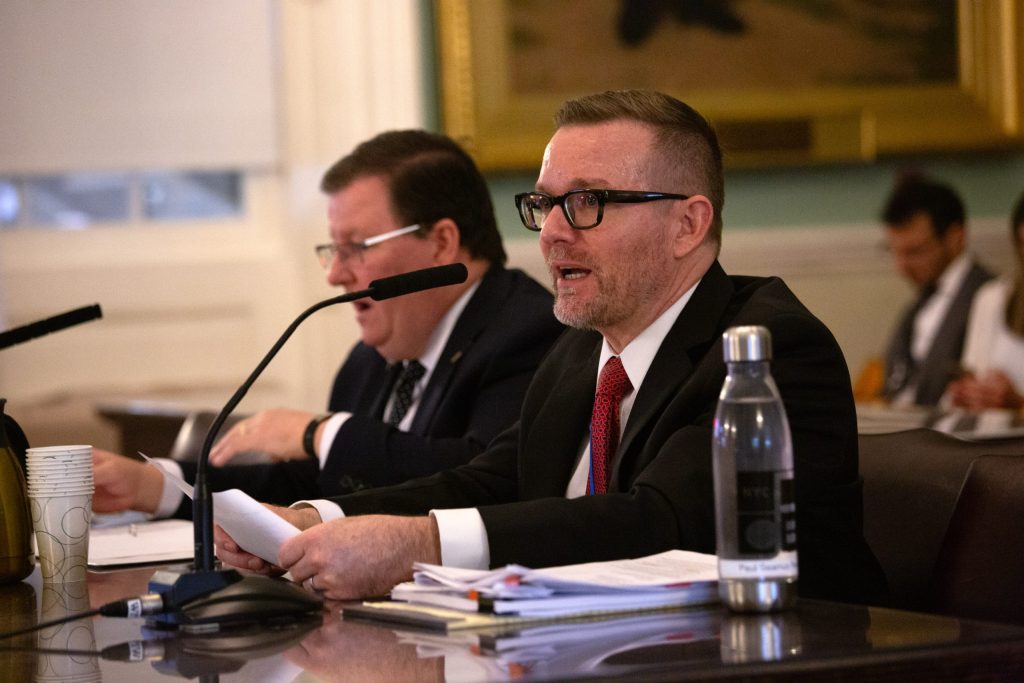Mayor Eric Adams will know as soon as next week if his reelection bid will qualify for millions of dollars in public matching funds as the Campaign Finance Board votes on the first tranche of payments for the 2025 contest.
At a City Council hearing on Wednesday, CFB executive director Paul Ryan testified that a candidate could be denied funding overall months ahead of the election, depending on questions about that particular campaign.
“There will be some judgment calls made by the board when making public funding determinations,” Ryan told Council members on the governmental operations committee — declining to mention Adams specifically.
The CFB will approve the first of eight payouts of matching funds for the 2025 elections by Dec. 16, he noted.
Since 1989, the nonpartisan city agency has administered taxpayer money to candidates running for municipal office (mayor, comptroller, public advocate, borough president and City Council) who qualify. The CFB upped the matching funds from $6-to-$1 to $8-to-$1 for the 2021 campaign on the first $250 of each donation from New York City residents, following a 2018 ballot referendum.
Ryan did not give specifics about the Adams 2021 campaign, noting he can’t comment on pending investigations and audits.
But Councilmember Lincoln Restler, a Democrat from Brooklyn, still pushed on why the board would give Adams more money when so many questions linger about his past campaign — and a federal indictment that alleges he obtained $10 million in 2021 matching funds fraudulently.
“How can the CFB make determinations on future matching funds when there are so many outstanding concerns that a candidate may have from their previous campaign?” he asked.
The Adams campaign repeatedly ignored red flags raised by the CFB during the 2021 campaign about suspicious donations — and secured the record haul of public funding, THE CITY has reported.
Adams’ indictment in September, following the prosecution of former Lt. Gov. Brian Benjamin in connection with his 2021 comptroller bid, put the CFB on notice about accusations candidates gamed the public financing system and placed the board under heightened scrutiny when it comes to payouts for the 2025 election cycle.
Earlier on Wednesday, Restler and Councilmember Bob Holden (D-Queens) published an opinion piece in City & State saying the “CFB should not give another dime to Adams” while his corruption case is ongoing.
Adams already faces several Democratic challengers for the June 2025 primary who are signed up with the matching funds program — putting Adams at a serious disadvantage if he’s denied.
In the federal case, Manhattan U.S. Attorney Damien Williams zeroes in on about $26,000 in donations to Adams’ 2021 campaign from foreign and other improper sources, much of it passed through other donors, to allege that the entire $10.1 million in matching funds Adams obtained in his successful bid for mayor was illegally obtained.
Had the Campaign Finance Board known about the allegedly illegal contributions, the Adams campaign could have been found ineligible to receive portions of the $10 million — or removed from the program entirely.
At the hearing Restler noted that the Adams campaign has “ignored or stonewalled” requests from the CFB for more information on his campaign, particularly relating to so-called fundraising intermediaries.
He said that the CFB has sent 13 requests to the Adams 2021 campaign since June 2021 — but the campaign only partially responded to two thirds of those, never addressed intermediary questions, and then stopped responding to the CFB completely for more than three years.
In May, the CFB sent a 900-page draft audit to the Adams campaign, which identified numerous possible violations of board rules, including unreported spending by fundraiser hosts and invalid claims for matching funds.
The campaign’s response was due Nov. 29 but has not been released publicly, according to a CFB spokesperson.
Vito Pitta, a lawyer for Adams, did not immediately respond to a text message seeking comment.
This fall, the board voted to approve amendments to its current laws that clarified how they could use their investigative power regarding complaints about campaign or independent spenders. Campaigns then have to demonstrate compliance in order to be eligible for public funds.

